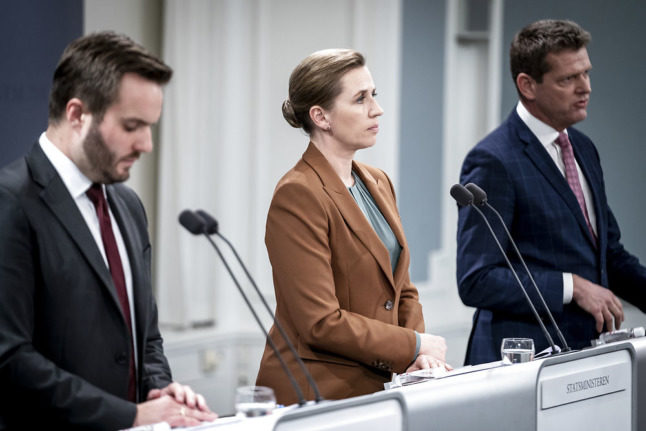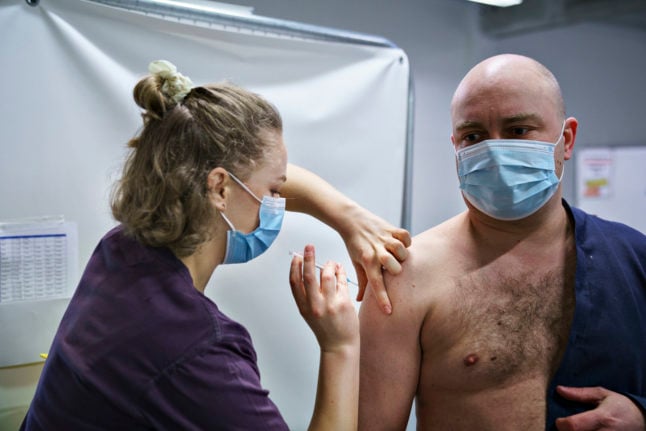The announcement came with infection rates at record levels and the Omicron variant now being transmitted in the community, meaning cases are no longer solely related to travellers infected abroad.
Earlier on Wednesday, reports indicated that the validity period of the country’s vaccine pass would be shortened.
The status of Covid-19 as a “critical threat” was extended by eight weeks, enabling new restrictions to be implemented unless opposed by a majority of parliament’s epidemic committee.
READ ALSO: Denmark extends ‘critical threat’ status of Covid-19
“When we entered the autumn we were prepared for infections to increase and for more people to unfortunately be hospitalised,” Frederiksen said at Wednesday’s press briefing, adding that the first response of the government was to push for more vaccinations.
But the emergence of the Omicron variant means additional measures are necessary, she added.
The independent Epidemic Committee advised the government to take action in response to the epidemic, and the measures announced Wednesday will not be opposed by a majority in parliament.
“(Omicron) is expected to mean more infections, more illness and potentially more in hospital. The new variant therefore also comprises a significant risk for critically straining the health system and that’s why we have to do more,” Frederiksen said.
In addition to ramping up vaccinations and boosters, Denmark has in recent weeks reimplemented Coronapas (Covid-19 health pass) and face mask rules.
The latest measures, announced on Wednesday, are listed below.
Restriction of nightlife
Bars, restaurants and nightclubs will be required to close at midnight and alcohol sales after midnight will be broadly banned, the government confirmed.
The rules come into effect on Friday.
Compensation packages are to be offered to businesses impacted by the closures, business minister Simon Kollerup said at the briefing.
School term to end early
Schools will close for Christmas one week earlier than planned and will remain closed until January 4th. Children remain among the groups with high rates of infection due to lower vaccination levels, although Denmark has now begun vaccinating younger children.
Lessons will be conducted online during the final week of the autumn term.
Standing concerts limited to 50 guests
Concerts with crowds of over 50 standing people will be banned from Friday. It should be noted that this does not apply to concerts where the public is seated, and gatherings of more than 50 in other settings, such as museums or sporting events, are not affected.
Additional face mask requirements
Face masks must be worn at restaurants, bars and cafes when guests are not sitting down.
A requirement for face mask use in the hospitality sector was in place earlier this year but was not initially brought back when mask use in stores and on public transport was reintroduced late last month. This changes from Friday.
Reduced vaccine passport validity
The validity period of a Covid-19 health pass or coronapas will be reduced to seven months after completed vaccination or booster vaccination.
As such, the validity of Denmark’s vaccine pass will be shortened from 12 to 7 months for fully vaccinated people (after a second dose) or those who have received boosters (after a third dose).
READ ALSO: Denmark ‘to reduce’ Covid-19 vaccine pass validity period
Firms asked to scrap Christmas parties and send staff home
Frederiksen called for companies to cancel their julefrokoster or Christmas parties and to enable staff to work from home where possible, in both the public and private sectors.
This is not a restriction but a recommendation. Danish Health Authority director Søren Brostrøm called it a “strong encouragement” in comments at the briefing.
Smaller family Christmas get togethers are not affected by this, though Brostrøm did suggest families follow “good, infection-preventing advice” when celebrating Christmas together.
But Brostrøm stressed that “it is vaccines that will get us through this winter so we can keep an open society without needing additional restrictions.”
“Vaccines, vaccines, vaccines,” he added.



 Please whitelist us to continue reading.
Please whitelist us to continue reading.
Member comments